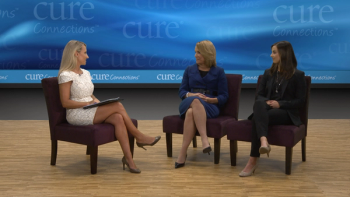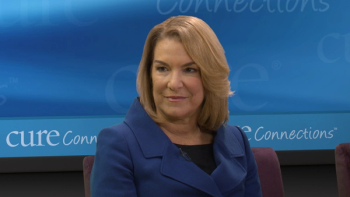
Ovarian Cancer
Latest News





Ten years after founding The Julie Fund for Women's Cancers, President Peter McAvinn's resolve is stronger than ever.

An analysis of data collected on thousands of ovarian cancer patients in California turned up some promising news for women with this diagnosis.

Maurie Markman urges patients with ovarian cancer who have undergone surgery to speak with their gynecologic oncologist and see if IP therapy is right for them.

Melinda Liggett Irwin, discusses The Women's Activity and Lifestyle Study in Connecticut (WALC) study, a randomized trial of exercise on quality of life and fatigue in women diagnosed with ovarian cancer.

We sat down with Adele Croteau, a survivor of cervical cancer from Ottawa, Canada, at I Had Cancer's "A Celebration of Shared Experiences Honoring You."

According to professional practice guidelines, women with ovarian cancer should get doses of chemotherapy that are based on their weight. When they receive less than that, a new study has found, the result can be poorer survival.

Kenneth Freundlich, neuropsychologist, Morris Psychological Group, Parsippany, NJ, and FORCE volunteer, discusses the importance of advocacy for patients with hereditary cancers.

Kenneth Freundlich, neuropsychologist, Morris Psychological Group, Parsippany, NJ, and FORCE volunteer, comments on supporting patients with hereditary cancers.

Sue Friedman, Executive Director, FORCE (Facing Our Risk of Cancer Empowered), discusses the ABOUT Network and the importance of informed decision-making.

Sue Friedman, Executive Director, FORCE (Facing Our Risk of Cancer Empowered), discusses the ABOUT Network and the importance of informed decision-making.

CURE Magazine and the Foundation for Women's Cancer have teamed up in CURE's Advocacy Spotlight Partnership program to battle women's cancer through education and shared advocacy on behalf of women suffering from below-the-belt women's cancers.

Backpacking through Nepal, two magicians discover a life-changing secret.

Treatment with a new PARP inhibitor called rucaparib demonstrated robust clinical activity and a tolerable safety profile for women with biomarker-defined relapsed ovarian cancer.

A two-pronged strategy combining the PARP inhibitor Lynparza and the PI3K inhibitor BKM120 proved to be a safe and clinically beneficial regimen for women with TNBC and for patients with high-grade serous ovarian cancer.

An oncology nurse navigator writes about her patient's journey with ovarian cancer.

Women who are at high risk of ovarian cancer are more likely to undergo preventive ovary removal if they are proactively offered genetic counseling, a new study has found.

While surgical advances and new treatment approvals, including Lynparza and Avastin, have improved the outlook in ovarian cancer, late diagnosis and tumor resistance remain as significant barriers to major progress in treating the disease.

Pretreated patients with recurrent ovarian cancer had a 2.5-month progression-free survival benefit when receiving fosbretabulin plus Avastin compared with Avastin alone; however, hypertension rates doubled.

Treatment with Avastin plus chemotherapy resulted in an improvement in overall survival of nearly five months compared with chemotherapy alone for women with platinum-sensitive recurrent ovarian cancer.

Treatment with the immunotherapy Vigil delayed time to progression in all patients with stage 3/4 ovarian cancer who were treated with the autologous tumor cell vaccine compared with those who were not, according to an open-label phase 2 trial.

Oncologist Don Dizon explains the advantages of intraperitoneal therapy and why further research and education are necessary to bring it to the forefront of ovarian cancer treatment.




